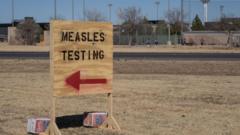A report by the US Health Department has come under scrutiny as it cites studies that do not exist, leading academics falsely credited in the report to express their concerns. The incidents raise questions about the credibility of the research aimed at addressing children's chronic health issues.
Academics Challenge US Government Report Over Fabricated Sources

Academics Challenge US Government Report Over Fabricated Sources
Concerns arise as a US government report on children's health cites phantom studies, prompting academics to dispute their association with non-existent research.
A recent report from the US government's health department has sparked controversy after it was revealed to cite "totally fabricated" studies, according to academics named as authors of these non-existent works. The report, initially released on May 22, aimed to identify factors contributing to a troubling "chronic disease crisis" among American children. An amended version surfaced shortly after, prompted by findings from the digital outlet NOTUS, which highlighted the seven cited studies that were never real.
White House press secretary Karoline Leavitt attributed the discrepancies to "formatting issues," asserting that while updates were needed, the core findings of the report remained intact. This report comes in the wake of directives from President Donald Trump, which includes extensive orders to investigate the implications of chronic diseases affecting children.
Led by US Health Secretary Robert F Kennedy Jr., known for promoting controversial views on vaccines and health, the report identified poor nutrition, exposure to environmental toxins, stress, lack of physical activity, and "overmedicalisation" as potential contributors to children's chronic illnesses. However, the academics cited within the document, including Columbia University's Guohua Li and Noah Kreski, have denied authorship of the cited work, calling the references “fabricated” and nonexistent.
Katherine Keyes, a professor of epidemiology also incorrectly named in the report, expressed concern over the integrity of citation practices and shouted the importance of rigor in scientific reporting. Additionally, another incorrectly attributed study focused on psychotropic medication marketing was disclaimed by the mentioned author, further highlighting the issues within the report.
The Democratic National Committee has criticized RFK Jr.'s Department of Health and Human Services, claiming the report seeks to validate its policy approaches with fictitious sources while laden with citation errors. Since taking office in February, RFK Jr. has notably cut staff within the health department and proposed introducing placebo-controlled trials for every new vaccine, compounding the scrutiny over his controversial approaches to public health.




















